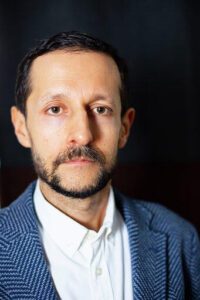Pavlo Kutuev is a sociologist who took part in one of three AABS-hosted panels this spring featuring Ukrainian scholars and their research. Each was recorded and is available for viewing on our YouTube channel. A couple months later, we asked several of those participant scholars to contribute a short piece to our yearly print newsletter, and we now republish those pieces online. Note: these pieces were written in May and June of 2022.
Pavlo Kutuev is a sociologist and political scientist based in Kyiv. He is professor of sociology and Sociology Department chair at Igor Sikorsky Kyiv Polytechnic Institute. He is working in the area of sociology of modernization and development, social theory of modernity, historical sociology of the developmental state and comparative politics of the post-communist transformations. He is the author of three books and numerous articles in sociology, comparative politics and history of social thought.

© Pavlo Kutuev
Given that we have been dealing with conflicts in our teaching and research for quite some time, I can’t say that our research focus has shifted dramatically. Obviously we need some time to reflect upon the tectonic changes caused by the Russian war against Ukraine. Yet the direction and the focus of our thinking remains the same. Our academic activities were put on hold just for two or three weeks following the Russian invasion since a lot of people had to relocate to safer areas—many cities including Kyiv were shelled—thus academics did not have a chance to work.
But then following the successes of the Ukrainian armed forces staving off Russian onslaught and driving Russian forces away from Kyiv we immediately began planning to resume teaching our students. And on April 4—just 40 days after the beginning of invasion—we duly did. Obviously the teaching is taking place online only. Our students—and faculty for that matter—are dispersed around the world. Our students have been exhibiting great enthusiasm and motivation about their studies.
It’s too early to draw conclusions, yet I think the war has taught us a lesson, which is realizing the importance of thinking beyond the war.
Winning the war is of existential importance. But it’s also essential to win the peace.
By winning the peace, I mean launching a comprehensive modernization of Ukrainian society, while avoiding pitfalls of authoritarian temptations in the post-war society.
As social scientists we all know perfectly well that there are no ideal societies. Yet, this Russian war of aggression against Ukraine is pretty much a black and white picture. The biggest country on earth—perhaps with the biggest nuclear arsenal—attacked its peaceful neighbor denying Ukraine the very right to exist. The Russian war on Ukraine has taken a genocidal twist after Bucha and many other Ukrainian settlements that have become scenes of war crimes committed by Russians. It is Putin’s war, no doubt about that. Yet the world must realize the Russian population’s at-large complicity in the war on Ukraine. The world has to take a more concerted and tougher stance on Russian aggression that has caused unspeakable atrocities and suffering for Ukrainians.
I think Baltic Studies scholars have already done a lot for Ukraine and Ukrainian scholars. AABS organized a series of seminars with Ukrainian scholars to discuss the Russian war on Ukraine and its impact on the Ukrainian society. I think that work should continue. We could jointly apply for research funding to support scholars and scholarship in Ukraine. We have to keep in mind that according to some estimates, Ukraine may have already lost about half of its GDP. The government has to focus on the war effort, so any assistance and aid from our colleagues from overseas is essential and critically important.
Although I am myself from Kyiv and by the virtue of my geographic location I have been out of harm’s way, the war has been a heartbreaking and devastating experience for me and my family. My family are now refugees and I don’t know when and if we’ll have a chance to reunite. My 9-year-old daughter and I have always been very close. The longest period of time I was away from my daughter would not exceed several days and even then she’d be just visiting her grandparents, so she’d be less than a two-hour drive away. She had her birthday recently and it was her first birthday at which I was not present. I am happy for my family that they are safe but it’s tough to be away from my kid for so long and rely on online communication only.
One of our graduates who became a commissioned army officer was killed in action. Another graduate also enlisted in the army at the beginning of the war and was taken POW. Unfortunately we have reasons to believe that he’s badly mistreated by his captors.
Our students and faculty are scattered around the world. It’s heartbreaking to read the testimonies of people who survived Russian occupation, lost their loved ones, were wounded, mutilated, or horrendously abused by the Russian occupiers. In cities that are close to front lines, people speak about scarcity of supplies of basic foodstuffs and medicines. Sirens warning about strikes and air raids have become a part of normal life and in Kyiv people simply ignore them.
Ukrainian armed forces have successfully and heroically driven Russians away from Kyiv, but the war has taken its heavy psychological toll on everybody, and I am no exception.
-Pavlo Kutuev, 2022
